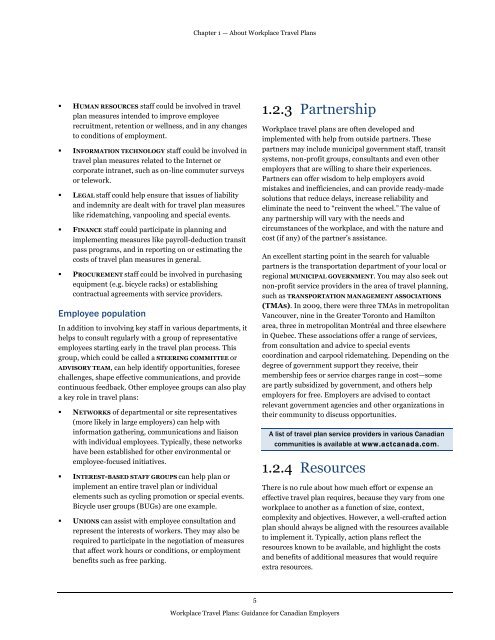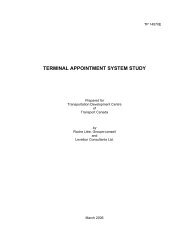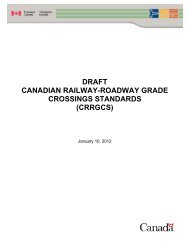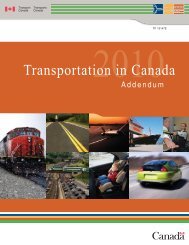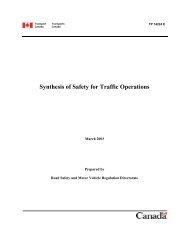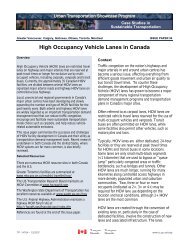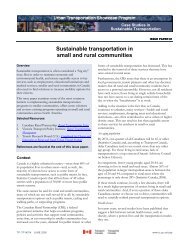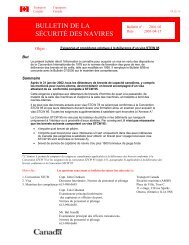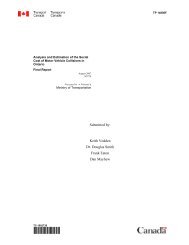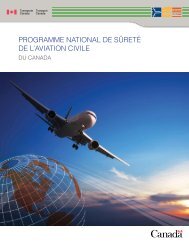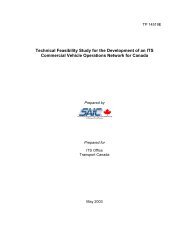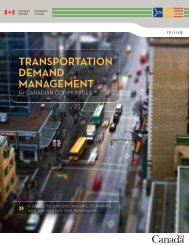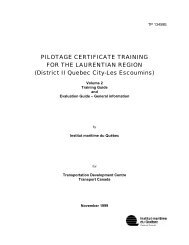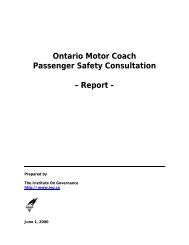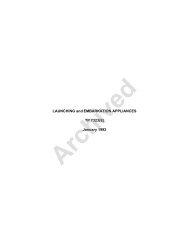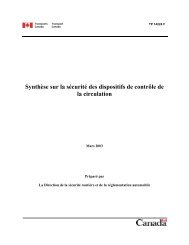Workplace Travel Plans - main body - Final Jan 2010 ENGLISH - FCM
Workplace Travel Plans - main body - Final Jan 2010 ENGLISH - FCM
Workplace Travel Plans - main body - Final Jan 2010 ENGLISH - FCM
Create successful ePaper yourself
Turn your PDF publications into a flip-book with our unique Google optimized e-Paper software.
Chapter 1 — About <strong>Workplace</strong> <strong>Travel</strong> <strong>Plans</strong><br />
! HUMAN RESOURCES staff could be involved in travel<br />
plan measures intended to improve employee<br />
recruitment, retention or wellness, and in any changes<br />
to conditions of employment.<br />
! INFORMATION TECHNOLOGY staff could be involved in<br />
travel plan measures related to the Internet or<br />
corporate intranet, such as on-line commuter surveys<br />
or telework.<br />
! LEGAL staff could help ensure that issues of liability<br />
and indemnity are dealt with for travel plan measures<br />
like ridematching, vanpooling and special events.<br />
! FINANCE staff could participate in planning and<br />
implementing measures like payroll-deduction transit<br />
pass programs, and in reporting on or estimating the<br />
costs of travel plan measures in general.<br />
! PROCUREMENT staff could be involved in purchasing<br />
equipment (e.g. bicycle racks) or establishing<br />
contractual agreements with service providers.<br />
Employee population<br />
In addition to involving key staff in various departments, it<br />
helps to consult regularly with a group of representative<br />
employees starting early in the travel plan process. This<br />
group, which could be called a STEERING COMMITTEE or<br />
ADVISORY TEAM, can help identify opportunities, foresee<br />
challenges, shape effective communications, and provide<br />
continuous feedback. Other employee groups can also play<br />
a key role in travel plans:<br />
! NETWORKS of departmental or site representatives<br />
(more likely in large employers) can help with<br />
information gathering, communications and liaison<br />
with individual employees. Typically, these networks<br />
have been established for other environmental or<br />
employee-focused initiatives.<br />
! INTEREST-BASED STAFF GROUPS can help plan or<br />
implement an entire travel plan or individual<br />
elements such as cycling promotion or special events.<br />
Bicycle user groups (BUGs) are one example.<br />
! UNIONS can assist with employee consultation and<br />
represent the interests of workers. They may also be<br />
required to participate in the negotiation of measures<br />
that affect work hours or conditions, or employment<br />
benefits such as free parking.<br />
1.2.3 Partnership<br />
<strong>Workplace</strong> travel plans are often developed and<br />
implemented with help from outside partners. These<br />
partners may include municipal government staff, transit<br />
systems, non-profit groups, consultants and even other<br />
employers that are willing to share their experiences.<br />
Partners can offer wisdom to help employers avoid<br />
mistakes and inefficiencies, and can provide ready-made<br />
solutions that reduce delays, increase reliability and<br />
eliminate the need to “reinvent the wheel.” The value of<br />
any partnership will vary with the needs and<br />
circumstances of the workplace, and with the nature and<br />
cost (if any) of the partner’s assistance.<br />
An excellent starting point in the search for valuable<br />
partners is the transportation department of your local or<br />
regional MUNICIPAL GOVERNMENT. You may also seek out<br />
non-profit service providers in the area of travel planning,<br />
such as TRANSPORTATION MANAGEMENT ASSOCIATIONS<br />
(TMAS). In 2009, there were three TMAs in metropolitan<br />
Vancouver, nine in the Greater Toronto and Hamilton<br />
area, three in metropolitan Montréal and three elsewhere<br />
in Quebec. These associations offer a range of services,<br />
from consultation and advice to special events<br />
coordination and carpool ridematching. Depending on the<br />
degree of government support they receive, their<br />
membership fees or service charges range in cost—some<br />
are partly subsidized by government, and others help<br />
employers for free. Employers are advised to contact<br />
relevant government agencies and other organizations in<br />
their community to discuss opportunities.<br />
A list of travel plan service providers in various Canadian<br />
communities is available at www.actcanada.com.<br />
1.2.4 Resources<br />
There is no rule about how much effort or expense an<br />
effective travel plan requires, because they vary from one<br />
workplace to another as a function of size, context,<br />
complexity and objectives. However, a well-crafted action<br />
plan should always be aligned with the resources available<br />
to implement it. Typically, action plans reflect the<br />
resources known to be available, and highlight the costs<br />
and benefits of additional measures that would require<br />
extra resources.<br />
5<br />
<strong>Workplace</strong> <strong>Travel</strong> <strong>Plans</strong>: Guidance for Canadian Employers


